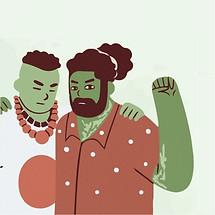THE FACTS
Quick, accessible mental health facts, made easy to read and share
Why Does Mental Health Matter?
-
Mental illness is often dismissed as an exaggerated fight or the emblem of a weak mind. But beyond the millions of stories people have shared about their own mental health journeys, the science is on our side.
-
Mental health matters because it has an impact. Not just on the individual's wellbeing, but also on an entire country's economic stability and a world society's intercultural empathy, peace, and growth.
-
Mental illness comes in a wide range of forms and timelines.
This is why we at L2S emphasize the personal identity of each individual we work with. At the same time, we recognize the importance of studying mental health statistics to better understand the trajectory of meaningful mental health activism.
Mental Health Brochures
Free, downloadable, and printer-friendly brochures exploring a range of psychological and sociocultural topics, adapted from our
Youth-for-Youth Mental Health Guidebook.
created by the L2S Team

COMING SOON
Subscribe to our FREE monthly newsletter to stay in the loop on the latest updates!

COMING SOON
Subscribe to our FREE monthly newsletter to stay in the loop on the latest updates !
Mental Health Infographics
Free, downloadable, and printer-friendly infographics breaking down important psychosocial topics and worldwide mental health stats.
created by the L2S Team

COMING SOON
Subscribe to our
FREE monthly newsletter to
stay in the loop on the latest updates!

COMING SOON
Subscribe to our
FREE monthly newsletter to
stay in the loop on
the latest updates !
Mental Health Facts & Stats
The following are collected by NAMI, The Huffington Post, Centers for Disease Control and Prevention, Mental Health America, and more.
-
The estimated cost of untreated mental illness in the U.S. is $100,000,000,000 (includes unemployment, unnecessary disability, substance abuse, etc.)
-
70-90% of individuals with mental illness saw improvement in their symptoms and quality of life after participating in some form of treatment.
-
25% of people with a mental illness feel that others are compassionate or understanding toward those suffering from mental disorder(s), yet 57% of adults believe that people are caring and sympathetic to persons with mental illness.
-
79% of all U.S. suicides are completed by men.
-
22 veterans die by suicide each day (although this number is at times disputed, the essence of the argument--that veterans do suffer and die by suicide--remains valid and important.)
-
60% of American adults didn't receive mental health treatment in 2012.
-
90% of people who die by suicide also had a mental illness.
-
Rates of youth depression are worsening. Even with severe depression, 80% of American youths are left with no or insufficient treatment.
-
19% of Americans with a mental health condition remain uninsured in states that did not expand Medicaid, and 13% remain uninsured in states that did expand Medicaid.
-
There is a serious shortage in the mental health workforce. In the states with the biggest shortage, there is only 1 mental health professional per 1,000 individuals. This includes psychologists, psychiatrists, social workers, counselors, and psychiatric nurses combined.
-
There are over 57,000 people with mental health conditions in prison/jail in Arkansas, Mississippi, and Alabama alone (these are the states with the least access to care and highest rates of imprisonment), enough to fill Madison Square Garden 3x.
As collected by World Health Organization, The Huffington Post, and Mind.
-
1 in 4 people in the U.K. experiences a mental health problem each year.
-
350,000,000 people worldwide of all ages are affected by depression
-
Depression is the leading cause of disability worldwide, and is a major contributor to the overall global burden of disease.
-
Close to 800,000 people die by suicide every year.
-
1/2 of all countries worldwide have fewer than 1 psychologist per 100,000 residents.
-
Suicide is the 2nd leading cause of death among 15-29-year-olds.
-
Fewer than half of those with depression worldwide (in many countries, fewer than 10%) receive effective treatment.






